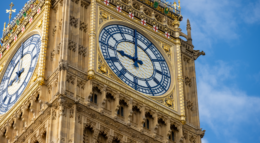
Farage's last stand
A Farage victory in Thanet South would be a disaster for the Cameroons.
South Thanet is a quiet, unassuming and picturesque constituency nestled in a corner of the Kent coastline. Its story is synonymous with many of Britain's seaside communities; a once thriving economy, now suffering from the ravages of dwindling tourism and an ailing fishing industry.
Despite these shared characteristics, South Thanet is unique. Like no other constituency in this election, it has come to symbolise the broader national struggle between the two main parties: Labour and Conservatives, and the threat posed by a popular uprising in the form of the Ukip insurgency.
For years, Kippers have been misunderstood by Westminster insiders. Political commentators from all sides of the divide have long peddled two misconceptions. The first is that the group's ascendency was merely a flash in the pan – an opportunity for non-voters and those on the fringes of the mainstream voter class to vent their frustration before obediently returning to the fold. This was neatly shown in 2012, when the Blairite Telegraph columnist, Dan Hodges, confidently predicted Ukip's forthcoming demise. So sure of his prediction, he pledged to 'streak naked down Whitehall in a Nigel Farage mask whilst singing Land of Hope and Glory', should the Party break six per cent on May 7th.
The second was that Ukip was primarily a threat to the Conservatives, and that its ranks are overwhelmingly constituted by disaffected former Tory voters motivated by their dislike of the European Union and a similar disdain for immigration.
These overly simplistic messages are not only wrong; they also reflect the extent of the gulf between many in Westminster and traditional voters from all the main political groups.
In fact, national polling indicates that on May 7th as many as one-in-seven voters are likely to back Ukip – so much for that flash in the pan, Dan.
Similarly – and while it's true many of Ukip's early supporters were once Tory – polling, combined with conversations with disaffected voters in safe Labour and Lib-Dem seats, indicates the rise of the 'purple scourge' has implications far beyond just the Conservative Party. A poll earlier this year by Populus found fewer than half of those pledging their support for Ukip on May 7th voted Conservative at the last election, while one-quarter voted either Liberal or Labour in 2010.
And so it is that we find ourselves in South Thanet. For all the Ukip bluster, you can forget Clacton, or Rochester; there's only one Ukip battleground that really matters at this election.
The outcome has profound implications for the future path of the Conservative Party (and, for that matter, Labour). A Farage victory in Thanet spells disaster for the Cameroon agenda. The Tory leader – or more likely his successor – will have little choice but to shift to the Right; to take a tough line on immigration, Europe, foreign aid and defence. Forced to reconnect with the Tory base, hoody hugging and husky selfies will be out, replaced instead by a return to a more traditional Conservative agenda.
But, should the Tories cling on in Thanet, it will spell disaster for Ukip and will likely keep Cameron's modernising agenda on life-support. For all his political acumen and triumphs at extending the peripheries of the political debate, Farage's principal failing is his inability to people manage. Unlike Salmond's careful nurturing of Nicola Sturgeon, Farage's contempt for potential rivals has left him with no viable heir – at least no one with the ability and appeal to capture the minds of disillusioned voters.
Ukip is Farage and Farage is Ukip. Whether they know it or not, the party's chips are riding exclusively on South Thanet. It's all or nothing. A Tory win will see the Ukip leader leave politics and, in all likelihood, Ukip fizzle away and return, once again, to the political wilderness.
A Farage win, however, combined with a Labour, Lib-Dem wipe-out in Scotland at the hands of the socialist Scottish nationalists will likely see a redrawing of the political divide not witnessed since the heady days of the early eighties when the SDP broke away from an increasingly extremist Labour Party. A Tory shift to the Right to counter Ukip, matched by an already left-of-centre Labour Party pulled even further left by a necessity to appease their backroom SNP bedfellows, could see British politics go back to the future.
Centrism will be out; a real choice will be in. Politics might just get interesting.

Comment Central was setup in 2016 by William Walter, the founder of Bridgehead Communications.











